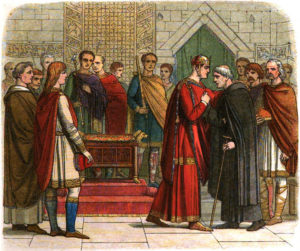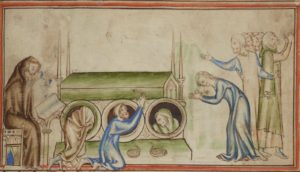
In my mind, this is one of the most provocative questions of the Middle Ages. In 1066, Duke William acted with the surety of someone who believed in what he was doing. To take such a big risk, he must have had good reason. William did not have a drop of royal blood in him, and his relationship to King Edward was a bit convoluted; Queen Emma, Edward’s mother, was his great-aunt. There were closer blood-ties to the English throne than his. So his claim must have relied on Edward’s alleged promise. Interestingly, this claim comes almost exclusively from the Norman chron-iclers; the English chroniclers are silent on the subject. That in itself is enough to raise some eyebrows. Or is it?
Much of the argument is based on whether Duke William crossed the Channel and visited King Edward while the Godwine clan was in exile. Florence of Worcester, writing a half century later, states that he did. Modern historians seem to conclude that this was unlikely, as William was still probably fighting to secure his own throne. Of course, this visit or non-visit would determine whether William’s claim was first-hand or second-hand. Did Edward personally declare William his heir, or did the announcement come through Archbishop Robert of Jumièges?
There is a reference that a grateful Edward, still in exile, promised William the crown in their younger days. I think we can safely discard this one, since Edward was about 25 years older than William. It has been suggested that Edward was throwing around promises of succession (kind of like Elizabeth I and promises of marriages). If Duke William did visit England in 1052, it is possible that Edward, cocky after having rid himself of the troublesome Godwines, was asserting his will. Maybe he meant it, maybe he didn’t. Surely Edward knew he didn’t have the right to give away his crown; that decision was made by the Witan.
If we accept the theory that William did not visit Edward in England, then the big promise was probably delivered by Archbishop Robert, presumably after his outlawry on the heels of Godwine’s return in 1052. There seems to be little doubt that Robert kidnapped the hostages Wulfnoth and Hakon when he unceremoniously fled from London. Whether or not this was with Edward’s connivance is uncertain, though it must have reflected unfavorably on the King since they were Edward’s hostages. If Robert did forcibly abduct the boys, this could explain why his exit was so violently resisted; perhaps there was a last-ditch effort to save Godwin’s son and grandson.
What did Robert do with the hostages? Ultimately he turned them over to Duke William. It has been suggested he told the Duke that King Edward declared William his heir with the approval of the Great Earls, and was sending the two hostages as surety. In all likelihood, William was inclined to accept this offer; why not? It all looked pretty convincing on the surface. This is the version I favored in THE SONS OF GODWINE.

This leads us to Harold Godwineson’s fateful visit in 1064, which opens up another slew of questions. The Norman chroniclers asserted that he came on King Edward’s orders to affirm the promise of the crown to William. Or did he come to negotiate the release of the hostages? Or was he merely blown across the Channel by a storm? Regardless, he became an unwilling pawn in William’s grand plan. It appears that the Duke had already made up his mind to go for it! Harold wasn’t permitted to leave until he swore to support William’s claim for the English throne. Although he swore the oath under duress, breaking his vow in 1066 was destined to follow Harold until the end, and probably encouraged the Pope to throw his support behind the Norman Duke—not an insignificant factor.
Could it be that Archbishop Robert made up the whole Edward story, as a personal revenge on Godwine and England for having treated him so shabbily? If he did fabricate the whole thing, it was a revenge served up cold, because Robert died a couple of years later and never saw how far Duke William was willing to go.
Cynthia Hall Grossman says:
I may get the book. I have read things from Duke William’s side.
Susan S. Maire says:
You might also like to read my book The Oath, focusing on Harold’s oath and the dilemma it caused him and well an examination of some of the facts or what has been accepted as facts, offered in an international trial context. Susan S. Maire